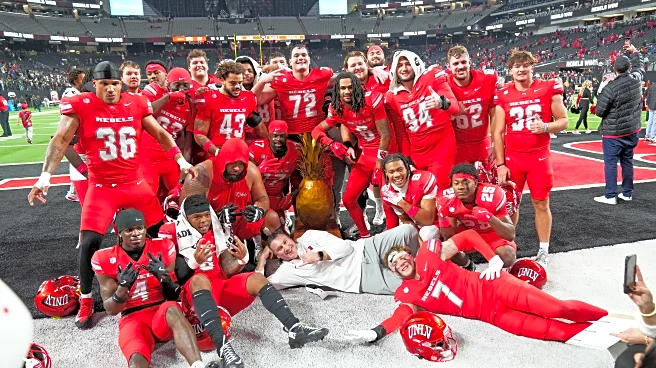What's Happening?
Meghan Morgan Juinio, former director of product development at Santa Monica Studios, has highlighted the need for the gaming industry to prioritize fun in game development over spectacle. Juinio, who
recently left her position at Sony-owned Santa Monica Studios, shared her insights at the Gamescom Asia x Thailand Games Show. She emphasized the unsustainable nature of current blockbuster game development due to high costs and significant layoffs, particularly on the West Coast of the U.S. Juinio suggested that major publishers like EA, Activision, and Ubisoft might need to shift towards smaller-scale games with lower production costs. She pointed out that viral hits from smaller teams have demonstrated success without the massive budgets typical of blockbuster games. Juinio believes that focusing on creating enjoyable games could be a viable path forward for the industry.
Why It's Important?
The gaming industry is facing significant challenges, including high development costs and widespread layoffs. Juinio's call for a focus on fun rather than spectacle could lead to a shift in how games are developed and marketed. This approach may benefit smaller developers who can produce engaging games without the need for large budgets. Major publishers might also find new opportunities in developing smaller-scale games that prioritize player enjoyment. This shift could impact the industry's economic landscape, potentially leading to more sustainable business models and a broader range of gaming experiences for consumers. The emphasis on fun could also attract a wider audience, including older gamers who may have less time to engage with lengthy, complex games.
What's Next?
If major publishers adopt Juinio's approach, the industry could see a diversification in game offerings, with more AA or single A games being developed alongside traditional blockbusters. This could lead to a reevaluation of investment strategies and production priorities within the industry. Publishers may explore new distribution channels and marketing strategies to reach a broader audience. Additionally, there could be increased collaboration between smaller developers and larger companies to create innovative and enjoyable gaming experiences. The industry might also witness a shift in consumer expectations, with players seeking games that offer fun and engaging experiences rather than just visual spectacle.
Beyond the Headlines
Juinio's insights raise questions about the cultural and ethical dimensions of game development. The focus on fun over spectacle could lead to more inclusive and diverse gaming experiences, potentially reducing the emphasis on hyper-realistic graphics and complex narratives. This shift might encourage developers to explore new genres and storytelling techniques, fostering creativity and innovation. Additionally, the industry's move towards smaller-scale games could democratize game development, providing opportunities for a wider range of voices and perspectives to be heard. This could lead to a more vibrant and dynamic gaming culture, with games that reflect a broader spectrum of human experiences.










